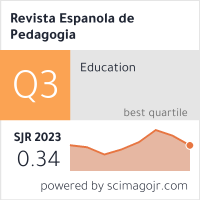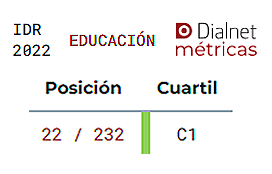Abstract
The present article analyses how cultivation of creativity underpins the possibility of rational dialogue with people who have different cultural origins by confirming the essentially productive character of human beings and contemplating creativity as a human dimension with intrinsic value, linked to the full realisation of the individual’s personality. The phenomenon of creativity is examined as an event that —sometimes dramatically— extracts the subject from the cultural world of mediations formulated within her own tradition that she usually inhabits, thus revealing to her a transcultural reality that manifests itself clearly. Recognising this original reality —which goes beyond the signifies constructed by different cultural traditions and from which creative action occurs— is the starting point for a true dialogue between cultures that enables a process of cultural critique, in other words, an examination of the validity of the products or objectivities of one’s own culture and the cultures of others.
This is the English version of an article originally printed in Spanish in issue 272 of the revista española de pedagogía. For this reason, the abbreviation EV has been added to the page numbers. Please, cite this article as follows: Espinosa Zárate, Z. (2019). El cultivo de la creatividad para el diálogo intercultural | Cultivating creativity for intercultural dialogue. Revista Española de Pedagogía, 77 (272), 29-45. doi: 10.22550/REP77-1-2019-05
Referencias | References
Álvarez, J. L., González, H., & Fernández, G. (2012). El conflicto cultural y religioso. Aproximación etiológica. In J. L. Álvarez & M. A. Essomba (Coor.), Dioses en las aulas. Educación y diálogo interreligioso (pp. 23-59). Barcelona: Graó.
Cropley, A. (2004). Creativity as a social phenomenon. In M. Fryer (Ed.), Creativity and Cultural Diversity (pp. 13-23). Devon: The Creativity Centre Educational Trust Press. Davies, D. (2004). Creative teachers for creative learners-a literature review. Retrieved from https://steveslearning.com/Teacher%20Training%20resources/Dan%20Davies%20Bath%20Spa.pdf (Consulted on 12/06/2018).
Dickhut, J. (2003). A brief review of creativity. Retrieved from http://www.personalityresearch.org/papers/dickhut.html (Consulted on 9/09/2018).
Gagné, F. (1991). Toward a Differentiated Model of Giftedness and Talented. In N. Colangelo & G. A. Davis (Eds.), Handbook of Gifted Education. Boston: Allyn & Bacon.
Gehlen, A. (1980). El hombre. Salamanca: Sígueme. Grupo SI(e)TE. Educación (2012). Creatividad, educación e innovación: emprender la tarea de ser autor y no sólo actor de sus propios proyectos. Revista de Investigación en Educación, 10 (1), 7-29.
Hegel, G. W. F. (2006). Fenomenología del espíritu. Valencia: Pretextos.
Heller, K. A. (2004). Identification of Gifted and Talented Students. Psychology Science, 46 (3), 302-323.
Ibáñez-Martín, J. A., & Fuentes, J. L. (2012). Competencias sociales e inmigración desde una perspectiva intercultural. Educación XX1, 15 (2), 41-72.
Inciarte, F. (2004). Imágenes, palabras, signos. Sobre arte y filosofía. Pamplona: EUNSA. Inciarte, F. (2016). Cultura y verdad. Pamplona: EUNSA.
Kant, I. (1999). Crítica del juicio. Madrid: Espasa-Calpe.
Lewis, C. S. (2012). La abolición del hombre. Madrid: Encuentro.
López Ruiz, J. I. (2000). Al otro lado de la Academia: el conocimiento empírico del profesorado. Revista de Educación, 321, 245-268.
Marx, K. (1974). Manuscritos: economía y filosofía. Madrid: Alianza.
Nussbaum, M. (2005). El cultivo de la humanidad. Barcelona: Paidós.
Piirto, J. (2011). Creativity for 21st Century Skills. How to Embed Creativity into the Curriculum. Rotterdam: Sense Publishers.
Platón (1871). Fedro, Obras completas. Madrid: Medina y Navarro.
Platón (2010). Apología de Sócrates. Barcelona: Espasa.
Regmi, K. D. (2016). Lifelong learning: Foundational models, underlying assumptions and critiques. International Review of Education, 61 (2), 133-151.
Revenga Ortega, A. (2005). A propósito del esfuerzo, memoria y conocimiento en educación. Aula de Innovación Educativa, 139, 82-88.
Runco, M. A. (2004). Creativity. Annual Review of Psychology, 55, 657-687. doi: 10.1146/annurev.psych.55.090902.141502
Runco, M. A. (2008). Creativity and Education. New Horizons in Education, 56 (1), 107-115.
Shaheen, R. (2010). Creativity and Education. Creative Education, 1 (3), 166-169. doi: 10.4236/ce.2010.13026
Steiner, G. (2011). Lecciones de los maestros. Madrid: Siruela.
The Guardian (23 February 2005). Intercultural innovation. Retrieved from https://www.theguardian.com/artanddesign/2005/feb/23/artspolicy.regeneration (Consulted on 9/9/2018).
Urban, T. (2015). The AI Revolution: The Road to Superintelligence. Retrieved from https://waitbutwhy.com/2015/01/artificialintelligence-revolution-1.html (Consulted on 25/6/2018).
Citación recomendada | Recommended citation
Zárate, Z. E.
(2019)
.
Cultivating creativity for intercultural dialogue.
Revista Española de Pedagogía, 77(272).
https://www.revistadepedagogia.org/rep/vol77/iss272/17
Licencia Creative Commons | Creative Commons License
Esta obra está bajo una licencia internacional Creative Commons Atribución-NoComercial 4.0.
This work is licensed under a Creative Commons Attribution-NonCommercial 4.0 International License









